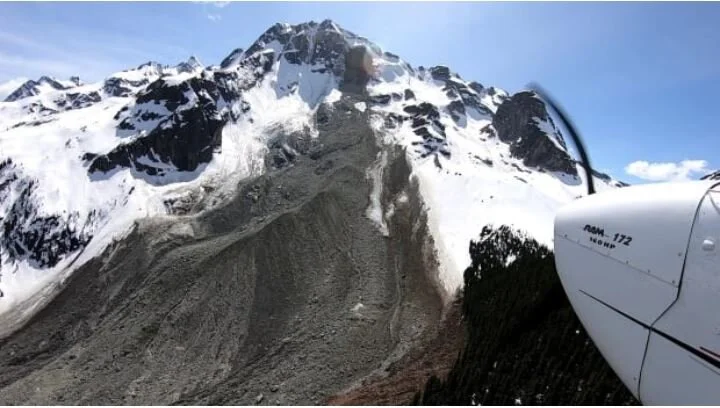When documentarian James Burns and Apache guitarist Stevie Salas set out to create a film that examined the ongoing impacts of the water crisis in Indigenous communities, the two knew they wanted the final piece to be an exploration of identity and how it's tied to Earth's most abundant natural resource. The result is an ambitious 104-minute documentary that blends unscripted real-life moments with scripted vignettes to go beyond the template of using statistics and experts to put the spotlight on an issue that transcends geographical boundaries.
Primo Water Announces Resolution of Litigation with Legion
Primo Water Corporation (NYSE: PRMW) (TSX: PRMW) (the "Company" or "Primo Water"), a leading provider of sustainable drinking water solutions in North America and Europe, today announced that it has agreed to a proposal of settlement offered by Legion Partners Holdings, LLC (together with its affiliates, "Legion") dismissing Legion's Application in the Ontario Superior Court of Justice. Both parties have agreed to bear their own litigation expenses.
Primo Water Corporation Announces Acquisition of Additional Mountain Valley Spring Site
Primo Water Corporation (NYSE: PRMW) (TSX: PRMW) (the "Company" or "Primo"), a leading provider of sustainable drinking water solutions in North America and Europe, today announced that Primo Water has acquired an additional spring water source adjacent to its current Mountain Valley spring in Garland County, Arkansas. "This acquisition provides an additional high-quality sustainable water source to supplement Primo's award-winning Mountain Valley Water portfolio. Mountain Valley is the #1 Premium Spring / Sparkling Single Serve brand in the Natural Channel with dollar growth of +53% vs. prior year according to SPINS. It is the oldest continuously bottled spring water in the United States and is nationally distributed in major retailers and foodservice operators," said Tom Harrington, CEO of Primo. "This additional water source supports our continued growth and strengthens Primo's commitment to offer sustainable water solutions to customers across our footprint."
A new mine could position Quebec as a lithium leader, but its rocky past worries locals
In an expansive open-air pit 550 kilometres northwest of Montreal, 100-tonne trucks criss-cross the climbing roads, preparing for the mine to open. The chalk-white veins of those rocks have metals inside, including one of the most sought-after minerals in the world: lithium, a key component of electric car batteries. When production restarts at the La Corne, Que., lithium mine early next year, it is set to be one of the only functional lithium concentrate mines in North America and position Quebec as a Canadian lithium leader.
Rivers, lakes dry up amid drought conditions
Drought conditions in parts of North America, Europe and Asia have left lakes, reservoirs and rivers much lower than usual. The dry conditions are causing problems for people who depend on the water for animal grazing and the shipment of goods. Some regions are being forced to ship water to those in need while others are resorting to cloud seeding in a bid to promote rainfall.
Primo Water Corporation Announces Strong Second Quarter 2022 Results and Raises Full Year Guidance
Primo Water Corporation (NYSE: PRMW) (TSX: PRMW) (the "Company" or "Primo"), a leading provider of sustainable drinking water solutions in North America and Europe, today announced its results for the second quarter ended July 2, 2022. (Unless stated otherwise, all second quarter 2022 comparisons are relative to the second quarter of 2021; all information is in U.S. dollars.)
PRIMO WATER CORPORATION ANNOUNCES ACQUISITION OF HIGHLAND MOUNTAIN WATER
Primo Water Corporation (NYSE: PRMW) (TSX: PRMW) (the "Company" or "Primo"), a leading provider of sustainable drinking water solutions in North America and Europe, today announced that Primo Water North America ("PWNA"), a wholly-owned subsidiary of Primo, has acquired Highland Mountain Water, located in Atlanta, Georgia. Highland Mountain Water is a leading independent distributor of Primo's Mountain Valley® premium water brand.
Water Purifier Market to Reach $92.1 Billion, Globally, by 2031 at 10.1% CAGR: Allied Market Research
Increase in disposable income, demand for water purification systems, and rise in concerns toward health and well-being among the global population drive the growth of the global water purifier market. Allied Market Research published a report, titled, "Water purifier Market by Technology (Uv, Ro, Gravity Based), by End User (Commercial, Residential), by Distribution Channel (Retail Stores, Direct Sales, Online), by Portability (Portable, Non Portable): Global Opportunity Analysis and Industry Forecast, 2020-2031". According to the report, the global water purifier industry generated $29.9 billion in 2020, and is anticipated to generate $92.1 billion by 2031, witnessing a CAGR of 10.1% from 2022 to 2031.
Forward Water inks strategic partnership deal to sell Aquaporin’s forward osmosis products
Forward Water Technologies (TSX-V:FWTC) Inc has announced a strategic partnership for the North American market with water technology company Aquaporin. Under the agreement, Forward Water will sell Aquaporin's unique biomimetic forward osmosis membranes for applications associated with lithium mining and extraction and water management within the oil and gas industry.
Male loons are getting smaller, raising concern over the health of North American lakes
The loons will soon be back, and the past year has brought startling scientific research that shows our best loved bird is not always what you thought it was. Walter Piper of Chapman University in California is the continent’s top researcher in loons and their behaviour. He tracks loons on hundreds of lakes in Wisconsin and Minnesota — similar, he says, to central Ontario, which he also knows. And he has found a problem.
RESEARCH FINDS SALTING ROADS IMPACTS DRINKING WATER
William Hintz, an assistant professor in the University of Toledo’s Department of Environmental Sciences, recently researched the deicing salt Americans use for roads and its relation to the survival of freshwater ecosystems. The findings were published in the journal Proceedings of the National Academy of Sciences. According to the research, the buildup of salt (especially in freshwater ecosystems), which come from humans’ agricultural and mining activities, deicing salt operations, and more, impacts freshwater systems, reported Inverse News. Humans are dependent on freshwater ecosystems for drinking water. The Great Lakes on the Canada-U.S. border provide drinking water for more than 40 million Americans, reported Inverse News.
News Release - Government guidelines across North America, Europe fail to protect lakes from salt pollution human activities, including de-icing in winter
The salinity of freshwater ecosystems caused by road de-icing salts, agriculture fertilizers, mining operations and climate change is increasing worldwide and current water quality guidelines don’t do enough to address the issue, an international study led by Queen’s University and The University of Toledo has found. The research, conducted in collaboration with dozens of scientists across North America and Europe, shows significant damage is being done to freshwater lakes by salt concentrations that are below ranges government regulators have deemed safe and protective of freshwater organisms.
Kohler Co. Expands Commitment to Addressing Water Challenges in Indigenous Communities in North America
“13.5 percent of First Nations communities in Canada cannot drink their own tap water. In Ontario, that number is 40 percent, which means 4 out of 10 First Nations in Ontario have unsafe drinking water,” said Christopher Bell, VP and General Manager of Kohler Kitchen & Bath Canada. “As a company focused on water, we are committed to promoting access to clean and safe water and are honoured to partner with Water First to develop sustainable solutions to water issues in communities across Canada.”
Texas storm slows Iqaluit's sewer expansion
A winter storm in Texas this February left residents without water and power for days at a time. Pipes burst across the state. This raised the cost of HDPE and PVC pipes across North America, and is one of the reasons that Iqaluit city council voted unanimously last week to defer a much needed expansion of its main sewer line. The city's sewer system is at capacity. There's a four-phased plan to expand it, and the second phase was set to happen this summer. Every bid the city received to do the expansion was millions of dollars over budget.
From wastelands to conservation: Why Alberta needs to start thinking about its wetlands
Tuesday marks the 50th anniversary of an international agreement to protect wetlands around the globe, and this may get you thinking what is so important about wetlands. For awhile they were looked at as wastelands, but over the past few decades, science has shown just how important these areas are. Dan Kraus, a senior conservation biologist with the Nature Conservancy of Canada, says wetlands were the first habitat to have been protected through a global agreement.
Decontaminating pesticide-polluted water using engineered nanomaterial and sunlight
QUÉBEC, Jan. 15 2020 /CNW Telbec/ - Atrazine is one of the most widely used pesticides in North America. Researchers at the Institut National de la Recherche Scientifique (INRS) have developed a new method to degrade it that combines a new nanostructured material and sunlight. Atrazine is found throughout the environment, even in the drinking water of millions of people across the country. Conventional water treatments are not effective in degrading this pesticide. Newer processes are more effective, but use chemicals that can leave toxic by-products in the environment.
Earth's frozen 'water towers' threatened by warming, population growth, report says
Water frozen at the tops of mountains that helps sustain up to a quarter of the human population is under threat from climate change, population growth and lack of proper management, according to a new international study. The systems store and transport water through glaciers, snow packs, lakes and streams. They supply water to 1.9 billion people on Earth. A group of 32 international scientists — including one Canadian — published a paper in the journal Nature on Monday to highlight the importance and vulnerabilities of what they call Earth's 78 water towers.
A second chance: Canada, U.S. renegotiate a critical water treaty
The Columbia River Treaty, an international agreement governing the flow of water between British Columbia and six U.S. states, will be 55 years old this year. It has not aged well. The river springs from the Columbia Icefield in the Rocky Mountains of B.C. and winds 1,930 kilometres through the Northwestern United States – Washington, Oregon, Idaho, Montana, Nevada and Wyoming. No other river in North America spills more water into the Pacific Ocean.



















